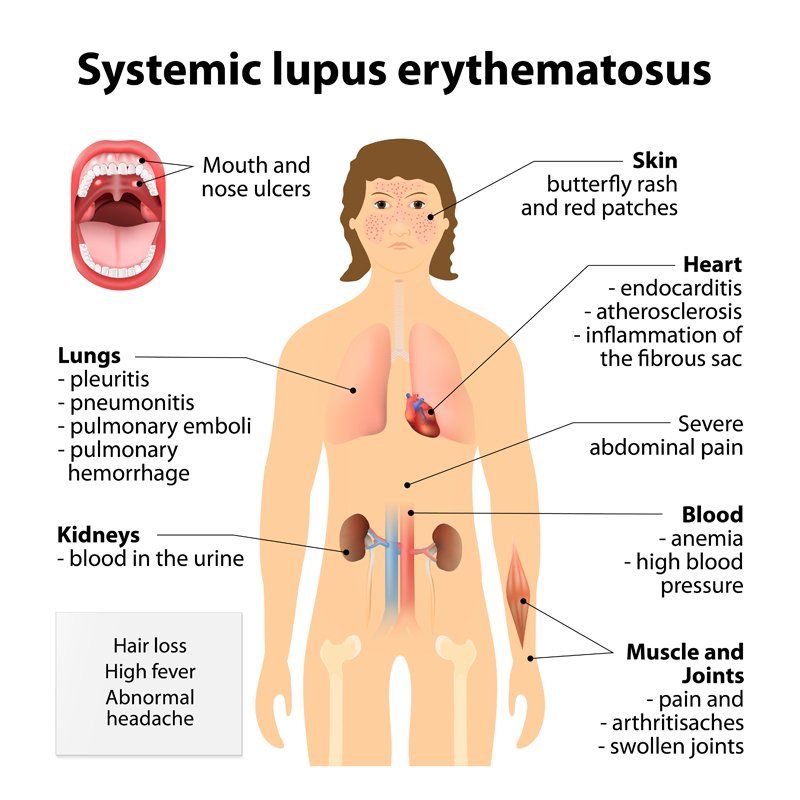What is Systemic Lupus Erythematosus?
Systemic Lupus Erythematosus (SLE, or Lupus) is an autoimmune disease that can cause inflammation and pain. The condition occurs when the immune system attacks healthy tissue instead of infections. There are several types of Lupus, and SLE is the most common. The disease can worsen and get better in waves. A sudden worsening of symptoms is known as a flare-up, and periods of good health after a diagnosis is known as remission. Permanent tissue can occur with Lupus, but there are ways most people can keep the condition under control and live a healthy life with only an occasional flare-up.
Common Symptoms of Systemic Lupus Erythematosus
With everything from body rashes and swollen glands to chest pain and blood clots, Lupus has a lengthy list of possible symptoms. Not everyone experiences all the complications, and most patients will only have a few that consistently bother them.
Many items on the list have multiple causes, so it is not unusual for a delayed diagnosis because people do not realize they have something serious causing the problems.
- Hair loss
- Fever
- Mouth sores
- Sores on the end of the nose
- Shortness of breath
- Muscle and joint pain
- Sensitivity to sunlight
- Body rashes
- A butterfly-shaped rash on the face
- Fatigue
- Chest pain
- Swollen glands
- Kidney, heart, or lung complications
- Seizures
- Headaches
- Depression
- Dry Eyes
- Stomach pain
- Anemia
- Raynaud's syndrome
- Blood clots
- Osteoporosis
- Swelling around the eyes
- Swollen legs
The Common Causes of Systemic Lupus Erythematosus
Lupus research continues, as there is still a lot that the medical community does not know about the disease. The exact cause is one of the unknown factors. Women contract the disease more often than men. Theories suggest that hormonal changes could cause the condition because women tend to develop Lupus during their reproductive years. In addition, smoking, a family history of the disease, and previous viruses may cause the health concern to begin.
Other potential causes could include excessive sunlight, the side effects of medications, and emotional stress. In addition, some research believes it could occur because of a complication in the immune response system that does not remove dead cells fast enough. The overreaction of the immune system may begin because of this complication.
How the Medical Community Treats Systemic Lupus Erythematosus
Treatment depends on the symptom severity of the patient and the organs involved. Aggressive treatments occur in patients with the most concerning health complaints. Medications are the usual treatment method. Some prescriptions address inflammation, and some relieve symptoms like fatigue and joint pain.
Other medications help reduce the risk of organ damage, treat skin problems, and help people feel more comfortable. Some medications suppress the immune system to lessen the range of symptoms experienced. Treatments often include oral medications, topical prescriptions, and IV drugs. Many lupus medications have potential side effects, so the doctor will usually start with a small dose and increase it as needed.
Additional medication could become necessary to treat the health concerns the condition causes. The prescriptions could include those given to treat high blood pressure, osteoporosis, infections, and heart disease. Some patients may receive drugs that doctors typically use to treat rheumatoid arthritis because they can alleviate joint pain and swelling.
How Lupus Can Be Treated with Natural Remedies
See Your Local Holistic Practitioner. These can include muscle testers like Applied Kinesiologists and Nutrition Response Testers, many of whom are Chiropractors. You can also consider Functional and Integrative Medical Practitioners, many of whom are holistic doctors. Depending on your symptoms, trained Dietitians and Nutritionists can also be an option.
Adding
whole food supplements to your treatment plan adjusts the imbalances in your body. Being under a professional's care will help eliminate trial and error, and wasted money spent on remedies that may not be appropriate for your exact illness. Most holistic practitioners offer a free consultation, so seeing two or three is an option. It would be wise to start here.
Alternative healers often prefer to start with supplements and diet changes. However, the extensive list of medications given to lupus patients can leave them vulnerable to interactions when taking some supplements. A healthy meal plan that includes supplementation will address the main concerns of lupus patients and can help many people. Always discuss with a doctor what food or supplements could interact with current prescriptions to learn about alternatives.
Homeopathic care can offer many natural and side-effect-free options for any treatment plan. An alternative care provider will work with a lupus patient to understand the symptoms they experience and the severity of their problem. Some patients benefit from acupuncture, and others may do better with massage or meditation. Chiropractic services can also provide relief for many common lupus symptoms.
Patients need to have their immune systems strong and functioning correctly to keep diseases, including autoimmune diseases, under control. People may not find an alternative solution that cures the condition, but they will often discover natural ways to combat the symptoms of the disease without causing new side effects. Alternative healing methods can work alongside traditional medical practices. The options give people more control over their wellness plans and show them the availability of natural solutions for their health complications.
Additional Resources
- Lupus Autoimmune Disease - Cleveland Clinic
- Lupus Diagnosis, Treatment, and Steps to Take - National Institute of Arthritis and Musculoskeletal and Skin Diseases
- Lupus Awareness - Centers for Disease Control and Prevention
Additional Information - Contact
Copyright 2020 All Rights Reserved. Art Licensed by Shutterstock©



